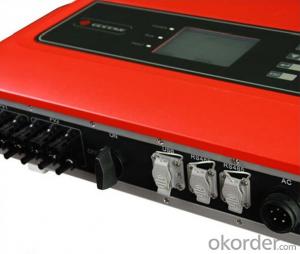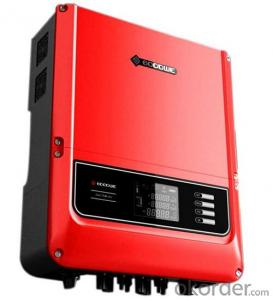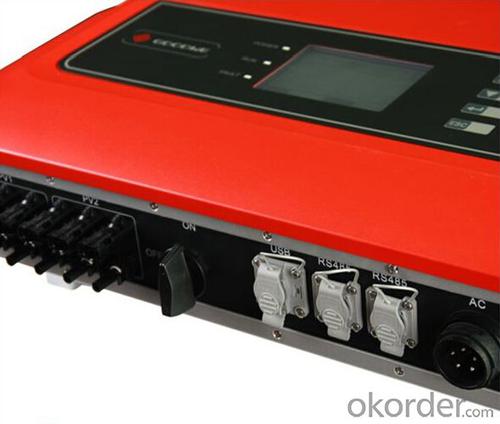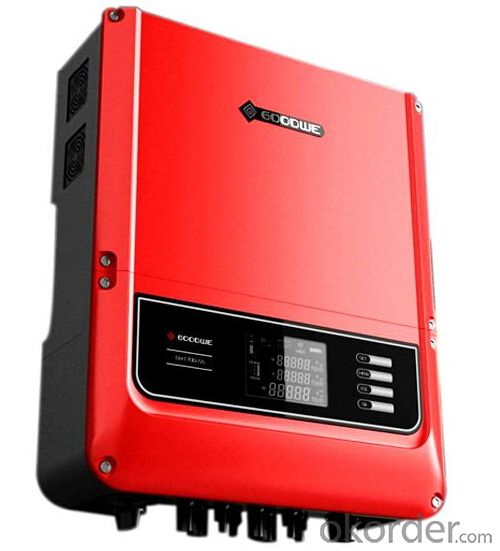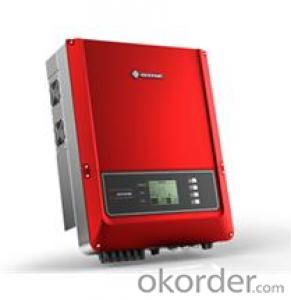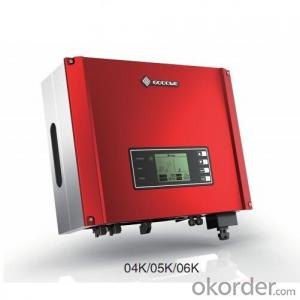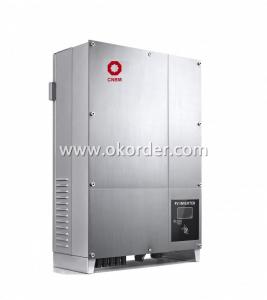On grid solar inverter GW12K-DT
OKorder Service Pledge
Quality Product, Order Online Tracking, Timely Delivery
OKorder Financial Service
Credit Rating, Credit Services, Credit Purchasing
You Might Also Like
GW12K-DT
GW12K-DT photovoltaic inverter is suitable for commercial and industrial roofs as well as small and medium-sized photovoltaic power systems.
Rich communication interfaces make it more convenient for network and monitoring.
The use of film capacitor achieves longer service life, more stable system and super-large LCD screen so that we have a commanding view to the run data of the machine.
Datasheet
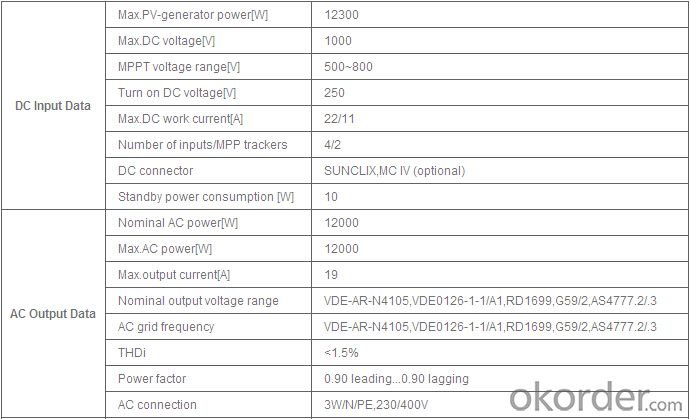
- Q: Can a solar inverter be used for both single-phase and three-phase applications?
- No, a solar inverter cannot be used for both single-phase and three-phase applications. The design and functionality of a solar inverter are specific to either single-phase or three-phase systems.
- Q: What is the purpose of a solar inverter in a solar power system?
- The purpose of a solar inverter in a solar power system is to convert the direct current (DC) electricity generated by the solar panels into alternating current (AC) electricity that can be used to power household appliances or be fed back into the grid.
- Q: What is the role of a bypass switch in a solar inverter?
- The role of a bypass switch in a solar inverter is to provide an alternate path for the solar energy to flow in case of a fault or failure in the inverter. It allows the solar power to bypass the inverter and directly feed into the grid or another designated load, ensuring continuous power supply and preventing any disruptions in the system.
- Q: Can a solar inverter be used in a three-phase power system?
- Yes, a solar inverter can be used in a three-phase power system. In fact, there are specific types of solar inverters designed to work with three-phase power systems. These inverters are capable of converting the DC power generated by solar panels into AC power, which can be seamlessly integrated into the three-phase power grid.
- Q: What is the efficiency of a solar inverter?
- The efficiency of a solar inverter refers to how effectively it converts the direct current (DC) power generated by solar panels into alternating current (AC) power that can be used to power household appliances or be fed back into the grid. It is typically measured as a percentage and represents the amount of DC power that is successfully converted into usable AC power. A higher efficiency indicates a more effective conversion process, resulting in less energy loss and maximizing the overall output of the solar system.
- Q: How does a solar inverter handle voltage and frequency variations caused by sudden load changes?
- Efficient and reliable, a solar inverter is specifically engineered to manage fluctuations in voltage and frequency resulting from sudden changes in load. When such changes occur, the solar inverter effectively employs a variety of control mechanisms to regulate and stabilize the output voltage and frequency. To begin with, the inverter continuously monitors the incoming solar power, keeping a close eye on the voltage and frequency. If any variations arise due to sudden load changes, the inverter promptly adjusts its internal control systems to compensate. Utilizing advanced power electronics and control algorithms, the inverter ensures that the voltage and frequency remain within the desired range. In order to handle voltage fluctuations caused by sudden load changes, the solar inverter utilizes a technique known as voltage regulation. It automatically adjusts the output voltage, either raising or lowering it as necessary. This guarantees that the inverter delivers a steady and consistent voltage supply to the load, effectively preventing any harm or malfunction. Similarly, to address frequency variations brought on by sudden load changes, the solar inverter employs a technique called frequency regulation. It adjusts the output frequency to match the grid frequency or meet specific frequency requirements. By maintaining the desired frequency, the inverter ensures compatibility and synchronization with the grid or other connected devices. In addition to voltage and frequency regulation, solar inverters also incorporate protective features to handle sudden load changes. They are equipped with built-in overload protection mechanisms capable of detecting excessive loads and preventing damage to both the inverter and the connected devices. These protective features may include safeguards such as overcurrent protection, short-circuit protection, and temperature monitoring. In summary, a solar inverter is purposefully designed to effectively manage voltage and frequency variations arising from sudden load changes. Through its voltage and frequency regulation capabilities, as well as its protective features, the inverter ensures stable and reliable operation. This enables the inverter to adapt efficiently to changing load conditions while safeguarding the integrity of the power supply.
- Q: What is the maximum number of solar panels that can be connected to a solar inverter?
- The maximum number of solar panels that can be connected to a solar inverter depends on the capacity and specifications of the particular solar inverter being used. However, in general, solar inverters can typically support anywhere from a few panels for residential systems to several hundred panels for larger commercial or utility-scale installations.
- Q: What is the role of a solar inverter in optimizing energy production?
- The role of a solar inverter in optimizing energy production is to convert the direct current (DC) electricity generated by solar panels into alternating current (AC) electricity that can be used to power homes and businesses. In addition to this basic function, a solar inverter also plays a crucial role in maximizing energy production by efficiently managing the flow of electricity, ensuring that the solar system is operating at its highest capacity, and adapting to changes in sunlight intensity to achieve optimal energy output.
- Q: How does a solar inverter handle sudden changes in solar irradiance?
- A solar inverter handles sudden changes in solar irradiance by constantly monitoring the input voltage and adjusting its output power accordingly. It employs maximum power point tracking (MPPT) algorithms to optimize the energy conversion from the solar panels. When there is a sudden increase or decrease in solar irradiance, the inverter quickly adapts by regulating the voltage and current to maintain a stable and efficient output. This ensures that the generated solar power is effectively utilized and protects the system from potential damage caused by voltage fluctuations.
- Q: What are the key factors affecting the compatibility of a solar inverter with other system components?
- The key factors affecting the compatibility of a solar inverter with other system components include the power rating and voltage compatibility of the inverter with the solar panels, batteries, and electrical grid, as well as the communication protocols and interconnectivity requirements between the inverter and other system components. Additionally, the inverter's efficiency, protection features, and overall design should be considered to ensure seamless integration and optimal performance of the entire solar power system.
Send your message to us
On grid solar inverter GW12K-DT
OKorder Service Pledge
Quality Product, Order Online Tracking, Timely Delivery
OKorder Financial Service
Credit Rating, Credit Services, Credit Purchasing
Similar products
Hot products
Hot Searches
Related keywords
